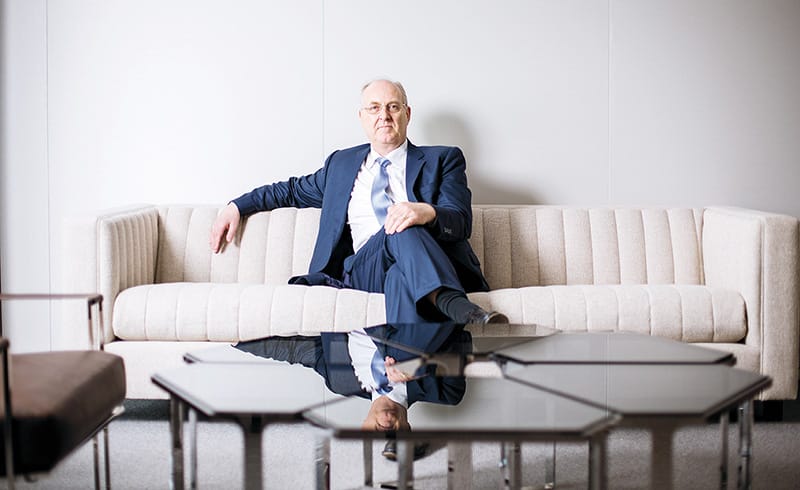
We are living in unique and historic times. That is the summation of Paul Sheard, Executive Vice President and Chief Economist at the financial services giant S&P Global.
Once a Japanese and geography student at Monash, Sheard is now a pre-eminent global economist, having spent almost three decades living and working in the northern hemisphere, first in Japan and now Manhattan’s financial district.
Seated in his office near Wall Street, taking in commanding views of the Brooklyn Bridge and the East River, Sheard suggests the current economic and political environment has thrown up a rare confluence of events.
“The longer I do this job the more it looks like I am seeing history playing out,” he says. “It’s unprecedented. Things have changed. The job of the economist increasingly feels like that of a geopolitical analyst. The value of looking at what is going on through a telescope, rather than a microscope has increased.”
Much of Sheard’s career in economics has coincided with periods of transition and tumult.
After completing his Japanese studies at Monash, he studied economics at graduate level and became a Japanese economy specialist. He moved to Japan in 1992 as the nation was being buffeted by its now-notorious financial crisis.
The subsequent recovery was followed by a period of deflation and unconventional monetary policy pioneered by the Bank of Japan and then the country’s first change in government in 39 years.
When he arrived in the United States in 2006, the Global Financial Crisis was already germinating.
“Since then it’s been a rollercoaster,” he says. “There really hasn’t been a dull moment. Now, the Trump administration is something else. I’m not surprised by anything.”
Sheard oversees four regional teams of economists, with a brief to cover economics globally.
“People tend to focus too much on the short term and not see the broader canvas,” he says. “So that’s part of my job: to see all the forces playing their way through.”
Sheard and his team remain focused on a cluster of percolating issues.
The GFC still casts a shadow on the global economy. Similarly pertinent: low interest rates and the unconventional monetary policy underpinning them.
The IT revolution, or the apparent fourth industrial revolution, is also having a disruptive impact, generating innovation but not (as yet) dramatically affecting growth.
“You don’t really pay much for your iPhone, but it gives you a huge amount of consumer surplus,” he says. “That is a disconnect. One of the things the information revolution has done is turn everybody into a broadcasting studio. That takes up time and resources. Perhaps we are consuming the productivity that way, rather than in more tangible goods and services.”
Other issues are the rise of China and India and the gradual shift in the global geopolitical economic balance.
“By some metrics China is now the biggest economy in the world,” he says. “It does not have a high per-capita GDP, but it has become a lower middle-income economy. It will continue down an economic development path, becoming a bigger part of the global economy and increasingly flex its geopolitical muscles.
“On the American East Coast now, it’s all about Russia. But it pales into insignificance in economic terms. Geopolitically, Russia punches way above its weight. I feel some disconnect between the rise of China and Russia.”
Then there is the pressing issue of economic inequality and the purported politics of populism, another reason Sheard’s role is anchored so much in geopolitics.
Take the turmoil around Brexit, the European Union and the architecture of the Eurozone.
“Fundamental structural issues have hardly been addressed in Europe,” Sheard says. “We are waiting really to see how Brexit plays out. Then there is the Eurozone, which is a monetary union, but not a fiscal unit. The status quo is not sustainable. Something has to change.”
And, of course, the consequences of Donald Trump’s election victory in the US are still reverberating.
“It’s difficult to be analytical and objective as an economist and have conviction about what is going on,” he says, carefully. “There are questions of authenticity and competence.”
This year’s iteration of the annual World Economic Forum, where Sheard is a regular participant, was held in Davos, Switzerland in the week leading up to Trump’s inauguration.
“China’s presence was very telling,” he says. “Questions were being asked about whether the US was withdrawing from globalisation and China will pick up the mantle. There is a lot to play out.”
Certainly the spectre of bombshell election results in the US and UK loomed large over the forum.
The longer I do this job the more it looks like I am seeing history playing out. It’s unprecedented. Things have changed.
“Populism is a dismissive word,” he says. “Economists have to eat some humble pie here. The financial crisis was a learning experience for the profession and damaged the value of our currency. Economists have tended to believe in market efficiency, barracking for deregulation and free markets. But what we haven’t recognised is that all the innovation happening revolves around network economics and platforms.”
That means the first to establish a platform is often the sole winner, creating enormous disparities in wealth.
“We think about the social contract and the best way to maintain societies,” he says. “With innovation such as artificial intelligence and machine learning coming, we will get much more output for the same input. But wealth may accrue for an increasingly narrow sliver. There may be more and more people left behind. We have to ask: what mechanisms can be employed?”
One billion dollars, he notes, is equal to one thousand million dollars. Amazon founder Jeff Bezos has been valued at more than $84 billion at various points in 2017.
“The market is a great mechanism for efficiency, stimulating innovation and producing the miracle of the invisible hand,” he says. “But the labour market is the mechanism for how people derive their purchasing power. Issues of redistribution were once considered more for politicians than economists.
“The idea that everything can be left to the market is too ideological and too simplistic. Economists can no longer outsource those issues to the political class.”
Reflecting on his remarkable career, Sheard says Monash provided him a superb platform through his formative years.
“Monash was very good to me,” he says. “I came from high school and became involved in student politics and elected to the union board. I wanted to spread my wings and see the world and Monash was flexible and accommodative to my aspirations. As an economist, I see the benefits of the invisible hand, but I always remind myself I have been very lucky.”
In fact his honours thesis, a product of two Monash departments (Japanese and Geography) was his first published paper in an academic journal.
“That helped to launch me into orbit,” he says.





